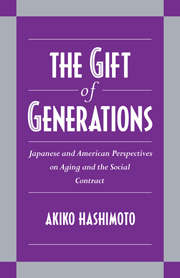Book contents
- Frontmatter
- Contents
- List of Tables and Figure
- Preface
- Acknowledgments
- 1 The Social Designation of Deserving Citizens
- 2 Two Communities, Two Societies
- 3 Rights and Responsibilities in the Public Domain
- 4 The Practice of Protection and Intervention in the Private Domain
- 5 The Japanese Viewpoint
- 6 The American Viewpoint
- 7 Cultural Assumptions and Values
- 8 The Social Regulation of Interests
- 9 Conclusion
- Appendix: Methods of Research
- Bibliography
- Index
7 - Cultural Assumptions and Values
Published online by Cambridge University Press: 03 February 2010
- Frontmatter
- Contents
- List of Tables and Figure
- Preface
- Acknowledgments
- 1 The Social Designation of Deserving Citizens
- 2 Two Communities, Two Societies
- 3 Rights and Responsibilities in the Public Domain
- 4 The Practice of Protection and Intervention in the Private Domain
- 5 The Japanese Viewpoint
- 6 The American Viewpoint
- 7 Cultural Assumptions and Values
- 8 The Social Regulation of Interests
- 9 Conclusion
- Appendix: Methods of Research
- Bibliography
- Index
Summary
To explain the cross-national differences and similarities outlined in the previous chapters, we will now focus systematically on the cultural and structural conditions that shape the social contracts. Here and in Chapter 8, I synthesize the comparative findings in a conceptual scheme, to identify the regularity of variation in the values and interests that shape these social contracts. In the previous chapters, the main purpose of the comparative analysis has been to illustrate the distinct features of the two cases. The comparative analysis now shifts to Tilly's variation-finding comparison to specify the systematic variation in the cultural assumptions of deservedness and fairness (Chapter 7), and in the structural relationship of the social contract (Chapter 8). The classifications of cultural assumptions and assignments of symbolic resources that I develop in these two chapters are typologies distilled from the comparative empirical analysis that characterize the essence of the helping arrangements. The conceptual scheme classifies the typical characteristics of the two cases, and specifies the principle of variation between them, to account for the differences and similarities of the social contract.
First, in this chapter, I will explore the cultural assumptions underlying the protective and contingency approaches to identify the systematic variation in them, and explain how they inform the social organization of help. These assumptions are grounded in the subjective realities in which people construct the meaning of their behavior, a vision of the world that they take for granted in everyday life; they represent the subjective interpretations of life and human relationships, and the universal experiences of compassion, vulnerability, and sacrifice.
- Type
- Chapter
- Information
- The Gift of GenerationsJapanese and American Perspectives on Aging and the Social Contract, pp. 143 - 162Publisher: Cambridge University PressPrint publication year: 1996



